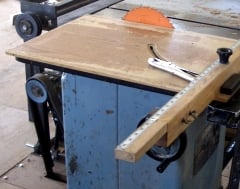Amish wood businesses: Furniture craftsmen, carpenters, sawmills and more
Turning natural resources into a diverse range of products
 From tree to finished product, Amish process wood all along the journey from forest to furniture. Amish sawmills, for instance, convert raw timber into lumber and other wood products for other industries. Other Amish do high-skill custom furniture and home carpentry work.
From tree to finished product, Amish process wood all along the journey from forest to furniture. Amish sawmills, for instance, convert raw timber into lumber and other wood products for other industries. Other Amish do high-skill custom furniture and home carpentry work.
Amish furniture makers typically work in conjunction with other Amish, in some cases purchasing raw materials or furniture parts from other Amish dealers, which are then crafted into “heirloom-quality” furniture pieces.
Amish are involved in a wide range of wood-related businesses, including:
Logging, sawmills and carpentry
A number of Amish businesses process wood on the front end of the chain. Amish loggers harvest hardwoods for furniture producers and other end-destinations. Some Amish deal in hard-to-find varieties of timber.
Sawmills are common among Amish, especially popular with groups which don’t permit the highest levels of technology. Sawmill work is simpler compared to custom-crafting furniture, thus is often seen in more conservative Amish communities. In recent years growing overseas demand has seen Amish sawmills sending product to China and other Asian destinations.
Lumber products also find their way to Amish pallet shops or truss makers, where they are turned into raw materials used in the construction industry. Some Amish create and sell wood flooring, molding and related products.
Another important Amish industry is that of home construction and carpentry. Carpentry crews are common in some Amish communities, offering young men an opportunity to earn a living without the capital demands of purchasing a dairy farm.
Like Amish furniture, Amish carpentry and construction has achieved a high reputation in the field. Some Amish do remodeling or specialize in restoration work, such as Amish in Lancaster County who do work on historic barns prevalent in the area.
Woodworking shops
Among Amish wood businesses, furniture makers and cabinet shops are most prevalent. Amish woodworking shops run the gamut from businesses producing wood parts to custom-design craftsman tailoring furniture and kitchen installations to individual homeowners’ needs.

Amish wood shops run on a variety of power sources. “Lower”, or more conservative Amish, such as those found at Ethridge, Tennessee, or parts of Holmes County, Ohio, run their machinery with the assistance of a drive shaft and pulley system.
A diesel generator powers the shaft which runs under the floor, often spanning the length of the shop. A system of belts and pulleys emerge from the floor along the length of the shaft, driving saws, sanders, and other equipment lined up along the axis of the shaft.
“Higher”, or more progressive Amish typically employ either pneumatic or hydraulic power to drive their equipment. Again, diesel generators are used to run equipment fitted to operate on air power, or the even more power-efficient hydraulic power.
Some Amish even generate electricity using the same diesel generators, for tasks such as welding, or to power electric lights (when permitted) in areas of a shop where an open flame gas light would prove hazardous (such as the finishing area of a furniture business where flammable coats of finish are applied).
Amish woodworking shops are typically located in a separate building on the owner’s property near the home. Amish woodworkers employ both other Amish and sometimes non-Amish employees. Amish wood shops may range from the solo sideline business to a shop run by a handful of neighbor men from the local church district all the way to the larger facilities employing 30 or more workers, sometimes including non-Amish workers (who often serve as drivers).
Some Amish shops specialize in a certain type of product, such as bedroom sets, tables, or chairs. Some businesses produce parts which are then purchased by other Amish businesses and assembled into the final product. Examples are spindle makers, used in staircases, or businesses producing components for Amish cabinet shops.
The Amish furniture market
Though Amish are associated with simple living and limited technology, Amish furniture makers market their products to a wide-ranging clientele, including buyers from upscale urban areas. Amish woodworkers promote their businesses through a range of media.
Some advertise in trade catalogs, or business directories featuring Plain companies. Others promote their wares online via third-party internet venues. Some may even operate a web site through a similar arrangement, with a non-Amish individual maintaining the Amish web presence.
Non-Amish retailers are also an important outlet in the Amish furniture industry. A whole host of businesses selling Amish products has arisen across the nation. The vast majority of US states are home to an Amish furniture seller, as well as many Canadian provinces.
Amish partner with non-Amish to distribute their products in non-Amish areas. Though Amish also operate their own retail furniture shops, due to their geographical limitations, their range is rather limited. However in larger Amish settlements in particular, a number of Amish-run retail shops can often be found.
Learn more on how to find Amish woodwork in the Amish Furniture Guide.






Black Walnut Trees
I have a mix of black walnut and butternut trees that I would like removed on a farm in NJ. Anyone interested in wood please contact me via email. Thanks Sean
Black Walnut Trees
I have a mix of black walnut and butternut trees I would like removed on a farm in NJ. Anyone interested in wood please contact me via email. Thanks, Sean
Walnut in York, Nebraska for sale
I am Gary Klundt from York, Ne. I have walnut logs and roots for sale. I live at 1011 Rd 11. My phone number is 402-366-0505. Please contact me to let me know if you are interested in looking at.
Thanks,
Felled logs
I have several tall straight Ash trees, and a maple already felled. Looking for somebody to clean up. You may keep all the wood. Baldwinsville New York (315) 420-3849
Free huge cherry tree
I have a cherry tree on my property and looking to get rid of it. I think its a black cherry its yours if u come to shelby ohio
Selling black walnut logs
Yea i have between 10and20 black walnut trees that im about to cut down and am selling would anyone be interested in them
Custom Woodworker
I need to find a custom woodworker to build custom pieces based off my sons furniture design concept. His business is increasing and his current woodworker can’t handle the extra capacity so looking to add someone. The pieces would be ordered as they are sold. If anyone knows of an Amish woodworker who does these type things please let me know.
Wood
Hello, i am looking for someone to come cut down trees. I know that some Amish are interested in pay to cut down trees. I am looking for someone that would like to come out to Batavia NY and take a look at trees.
Thank you
Kristen Lazarony
Logs for sale
I have recently cut and stacked a bunch of poplar and pine logs 8 – 10 foot in length if you would be interested
231-796-3058
19260 Indian Dr
Paris MI 49338
I have a massive, 65 foot Cherry tree on my beach at end of Wagar Rd It’s too big for a large chainsaw. It has beautiful figure. I’ve done a lot of wood work, but never seen anything like this. 440 334 4118 if interested
Black Walnut for Sale
I have a black walnut tree in my back yard and it’s in my back yard and it’s a healthy tree in good condition a healthy tree in good condition and we would like to know if anybody would be interested in the tree.. I don’t want the tree to be just cut down and turned into firewood I would rather it go to somebody with some true skill to somebody with some true skill to give it a Second Life give it a Second Life that couldn’t last for the next 200 years 200 years.. Please contact me via email Please contact me via email or call at 402-719-5014 I’d love to schedule a time you guys can come out I’d love to schedule a time you guys can come out take a look at it if you maybe interested.
Black walnut for sale
I have 2 long straight walnut trees cut and ready for pick up. For sale 50 miles south of Pittsburgh/35 miles north of Morgantown. 7246279821 leave message.
Black Walnut
I have a large standing black Walnut tree I would like to sell .Approximately 4 ft across at least 100 ft tall . Would be great for a table ect…I also have a few smaller ones ..if anyone would be interested please contact me to set up a meeting 609 618 0776 ..thank you have a wonderful day
Shale bark hickory trees for sale. Cut and stacked. Brooke County, WVa
Come see me about the trees. Let’s make a deal
Large Redwood
I have a large redwood tree in my front yard that I would like removed if there is anyone interested in this wood please contact me at 216-640-1929.
Looking for a Wood Business that makes Wood Doors
I am looking to purchase a Front Door for my house anyone interested that is a maker of front entry doors please call me at 317-432-0571.
Thanks,
Ronda
Amish wood businesses: Furniture craftsmen, carpenters, sawmills and more
Hi there, after reading this remarkable paragraph i am too glad too share my familiarity here with friends.
Black walnut tree in Lakewood, Ohio, do you want it?
I have a black walnut tree that I want to remove from my yard. Looking for anyone interested in taking the tree down or sharing the cost of taking it down plus the wood for yourself. Anything to get rid of it. Message me if interested
60-75 ft White Ash tree removal needed, Columbia Station, Oh
I have one dead, split twin trunk, approx. 40″ dia. trunk base, 60-75ft White Ash tree that I need to get removed. I am also considering removing the top 50% of five(5), 60-75ft tall, straight pine trees. Three(3) of the trees are White Pines, the other two(2) are Spruces. If anyone would be interested in removing these trees, for the wood, please do not hesitate to contact me by email.
Hickory tree down in my yard.
I was told 15 years ago by my neighbor that my tree in my yard was hickory. If i ever got rid of it the Amish love hickory trees for crafting. I was reaching out to say today on 4/13/2020 that tree came tumbling down from a tornado! Contact if interested!
White Oak for sale or free cut down
along my property line I have 40 – 45 foot tall – white oak trees -alive – they’re roughly 30 inches around very massive very straight white oak trees.
LARGE Oak Tree need gone
In my yard I have a HUUUUUGE oak tree and 2 more large trees in my front yard I rly need to sell and get gone…. How do I go about doing this?
Black walnut tree
I have a black walnut tree in my yard. 38 inches in diameter the trunk is about 20 feet tall. Location Rockford Il. If interested please email me.
huge maple tree
I have a maple tree that is approx. 23 feet in diameter. Many straight huge limbs. Free for the taking. Utica NY
Very large Oak trees
We have 3 very large, tall and about 3 foot diameter with no limbs for 25 to 35 feet.
Please let me know if interested.
We are located near Harrisburg, Illinois
Phone is907 229 0066
Very large Rad Oak trees
I live on a lot of wooded acreage and am looking for anyone interested in the Red Oak timber. Not looking to get money for the trees but you cut and haul away. Located in the upstate of SC. Message me if interested
Huge oak tree
We have a huge oak tree in our back yard that is dying. We’d like it to be removed. If the wood can be used, we’d love for someone to be able to use it. Please message me if interested.
Amishamerica.com/
This is very useful post. I appreciate this post. Thank you for the post.
Selling Milled wood
I have several pieces of wood 5 1/4″ thick 8″ – 18″ wide.
I have oak, white oak, cherry, ash, maple 8’plus.
I had these trees milled and have been seasoned and kept in
a garage. Please let me know if you would be interested in purchasing them.
I live in Orange County New York.
Thanks
Ed Devitt
Hickory tree
I would like to have a very large and old hickory tree cut down. It would make fine cupboards or ax handles or more. It’s tall and straight. Please contact me to remove. Looking for soon please. Thank you, Karen
White Cedar for sale
I have a large amount of White Cedar logs for sale. Already cut down and ready to ship from Michigan.
Black walnut tree for sale
I have a few black walnut trees I would like to sell , location, Albion ny 14411
Black walnut tree available in Spencerport, NY.
We would like to know how well this site works to have the black walnut trees lumber get into the right craftman’s hands.
Free trees - Bridgeport NY
Hello,
I have a bunch of trees that I need cut down, and could be kept by those who want them. Unsure what types of trees they are. Located in Bridgeport NY
We have 30 large oak trees just harvested last month on our farm in
We have 30 large oak trees for sale,already cut down last month. Ready to be sold
Black walnut and black cherry trees. Big, multiple.
I have huge black walnut trees I would love to have cut down and taken away. For free. You can have the trees if you cut them down. I live in southeastern PA.
Oak trees for sale
Amish timber businesses. I have several very large standing oak trees in my yard for sale. You remove them and give me a fair price for the timber. Located in Grove City, Pennsylvania. Contact me.
Wanted
Looking for large volume of white pine blanks to be used in further manufacturing. small pieces good use of scrap recovery.
Home owner
I have 2 black walnut trees willing to sell are you interested
Pine and spruce trees
19 total trees looking to sell in the greater Cleveland area.216-802-8302.very large trees.
7 large White Pine cut looking to give away
We had 11 white pine trees cut 3 days ago, and plan to keep 3 or 4 of them, so we have 7 to give away. They were 30+ years old and healthy, straight. Had to cut due to their size and location. The main trunks are about 20′ or more long and probably 20″ to 24″ wide. We would prefer to donate them to a sawmill or to see used for building verses for outside fire pits. They are cut, we are in the process of cleaning the up the branches. Please contact if interested, they need gone as soon as possible. Located in the Lititz/Manheim PA area. Thank you.
I have 5 black walnut trees I want to sell anyone interested
I would like to sell 5 very big black walnut trees.
Black Walnut
We have two large black walnut trees that we’d like taken down. We live in Minnesota. Is anyone interested in harvesting them for the wood?
Black Walnut and Maple Wood available
I have 5 – 6 large black walnut trees and two large maples. None of the black walnut trees or maple trees have ever contained nails or other metal. I’m looking for someone who could use the wood. I also have some weathered lumber from an old stable that would be useful in woodworking projects. (Stable is already dismantled. We live about 10 miles from Pittsburgh.
Walnut trees (2)
I have 2 walnut trees for sale!
Log House
I live near Lancaster, Pennsylvania and am familiar with the Amish quality and timeliness of barn structure building. I currently am in need of an Amish crew to frame a log house in Sevierville Tennessee. I will pay for all costs involved including transportation, housing, meals, etc. If anyone is interested (or knows of someone who would like more information), please let me know at (717) 421-8903 or longriflecabins@gmail.com
Thank you, Brian Weimer.